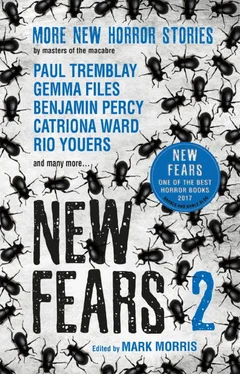Marge had always loved his body, or at least that was what she had said. Now he could not imagine how that was possible—he couldn’t stand the look of it, the smell of it. Did everyone else smell their own stink the way he did? He considered that perhaps they didn’t, otherwise they’d be unable to show themselves in public.
He heard a murmuring beyond the bushes from where his neighbours had their lawns, and lives. He tried to put down his coffee cup and climb out of the chair but the cup was no longer in his hand. He searched the ground around him but found only mushrooms, hundreds of them showing their dirty faces to the sky. Of course it was their season, but he hadn’t noticed them when he first sat down.
He stood and made his way across the lawn, walking carefully because he didn’t want to step on any of the mushrooms. Although he couldn’t imagine there being any danger in it the prospect repelled him. He almost stumbled over an old log by one of the dead flowerbeds. He remembered how he had placed it there under Marge’s instructions. Now it had dark, spongy pieces falling away and a spread of moss over one end. Moss crept up the bases of several other trees in the yard—some of it a bright, almost phosphorescent green, and some of it dark and dry-looking, like spreading patches of dead skin. The sight made him want to rub his arms, but when he tried it hurt, as if the skin were loose and detaching itself from the muscle underneath.
He thought of Marge, and how in her last days she had seemed this old, rotted log, and he hated himself for it. She had been his beautiful wife. Should he call the man back to remove this log, or would that only make him feel worse? Suddenly he was at a loss as to where he should step. A tumble of bleached flesh and internals had spilled from one of the flowerbeds, gummed together with translucent membrane. It smelled both sweet and sour. It alarmed him that he suddenly felt hungry, thinking of seafood, which at one time he had loved. He had an impulse to drop to his knees, bend and fill his mouth with its rankness. It was like leaping off a cliff, not caring at all.
He looked again. It was ordinary dead vegetation; how could he have thought otherwise? Nothing here that reminded him of human flesh, although there in one corner, sunlight stirring some cobweb, some network of filament, seemed vaguely familiar. He immediately looked away.
A sharp pain on the back of his right hand. He raised it, making a fist. Some sort of wasp was stinging the same place again and again, aggressive in its attack. Odd—he hadn’t seen any wasps in a few months—weren’t they out of season? It turned its tiny head and appeared to glare at him, its multifaceted eyes far bigger than they should have been. He shouted and shook the thing away. Now in terrible pain he stumbled toward the back door.
One of the outdoor lamps had separated from the wall and now lay in pieces to one side of the back door. Broken glass scattered like a spray of ice. When had that happened and why hadn’t he noticed it before? At one shattered end a pile of crushed insects—moths and mayflies and the like—lay with their bodies roasted by the bulb. More invisible flying things buzzed at him. He cried out and struggled with the knob, finally jerked the door open, slamming it shut behind him.
Both daughters stayed at the house until the hearse arrived. The nurse had given him some names of funeral homes, and once he’d made his selection she made the initial call. While his girls cried over their mother’s body he waited in his study. He thought he simply wanted to honour their privacy, but in a moment of clarity realized he couldn’t bear to witness that moment. He had no idea if this made him a bad person or not.
When the men arrived he went downstairs and let them in. He was surprised to see their black suits and ties, and the long black vehicle parked in his driveway. Andrew wasn’t sure exactly what he’d expected, but he hadn’t expected this TV-like scene. They were quite circumspect, and one practically whispered that they needed his signature before they could come inside. He signed, but did not read the paper on the man’s clipboard. He showed them upstairs, and they said hello to his daughters. The one who had done all the talking said the family might not want to be in the room as they removed the body. His daughters insisted on staying, while he retreated into the room next door. He stood there, waiting, unable to sit down. He heard a sliding sound coming from the bed, and one of his daughters made a sudden, soft sob. He did not know what she had seen, and would never ask.
It had been explained to him that the transporters would take the body to a central place, a “hub,” where it would wait with other bodies until picked up by the designated funeral home. He could not imagine such a place, and he knew that Marge would have hated the very idea.
In his bathroom Andrew poured disinfectant over the sting, and then waited there cradling the injured hand with the other until it stopped burning. Then he took a long shower. He’d started taking multiple showers every day after Marge died. He wondered if that was bad for the skin. He really should look it up. It wasn’t that he felt dirty, or in any way unclean. He simply liked the release it gave him. There seemed to be a kind of exchange, the heat, the liquid passing into his flesh even as some aspect of his flesh—some tension, some secret—passed into the water, striking the tiles beneath his feet and disappearing down the drain. He wondered if it were possible to stay under the water for so long the body eventually disappeared. He would have to look that up as well.
When the snow finally did come it was almost a surprise. It filled the sky rapidly with bits of white—as if the world were rapidly disintegrating to reveal the blank backdrop beneath. Andrew wandered from window to window, opening all the curtains, eager for some new view. Snow quickly packed the lawns, piled up against the fences, gathered along the edges of limbs, highlighting then weighing them down. By the time it stopped late in the day there was at least a foot of heavy, wet snow, maybe more. The world lay hushed and lifeless beneath its sheets.
Inside the house the rooms filled with brilliant snow-glare. There was nothing flattering in its revelations of dust and grime accumulated since his wife’s death, the spaces left empty from furniture removed, the aging stacks of laundry and unopened mail. Had he really been living this way?
He glanced out an upstairs window into the back yard. Snow had erased almost everything, an emptiness bounded by fence. But there, a man was climbing over his fence, his face turned up defiantly in Andrew’s direction.
He pulled on his slippers and raced down the stairs. He grabbed the poker from the fireplace and went through the porch and the door and into the backyard. He kept the poker raised, stepping awkwardly through the snow, watching for the man’s footprints. The snow was churned by the fence, but Andrew could find no distinct trail.
His feet were completely swallowed up by the white, but he didn’t really feel that cold. There was a chill, certainly, stiffening his skin and making him blush, but nothing that he couldn’t handle. He’d handled so much already, and he was doing just fine, wasn’t he?
The old chair under the maple had finally collapsed, pieces of it protruding above the snow.
He wasn’t sure where to go. He heard a terrible sound of breathing behind him and swung, throwing him off balance, sprawling into the snow. Something dark and furious leapt over him, attaching itself to the fence. Andrew jerked his head up. An old man was perched on the top of the fence, staring at him. It didn’t seem possible—surely that fence was too flimsy to support the weight of a man. And yet there he was, staring at him wide-eyed and shaking. Andrew felt suddenly weak and dizzy and struggled for breath. His chest felt as if it might erupt.
Читать дальше












